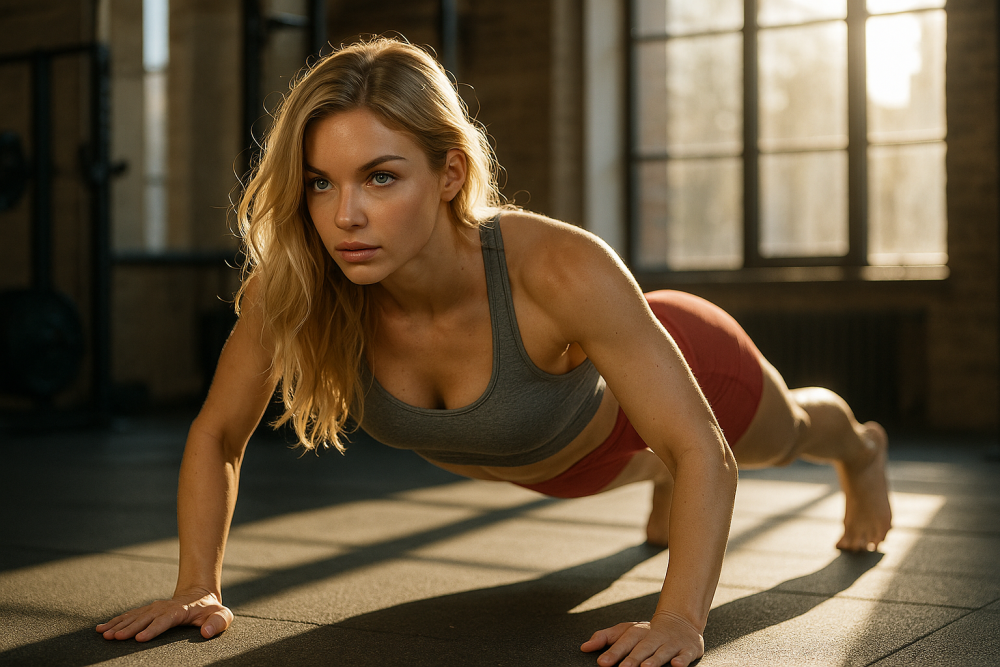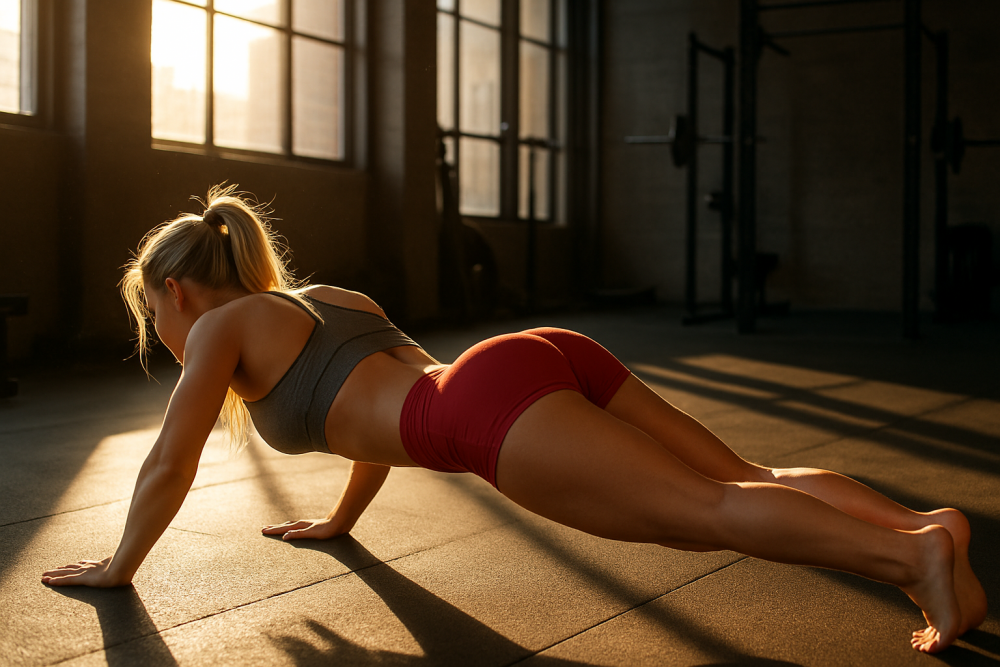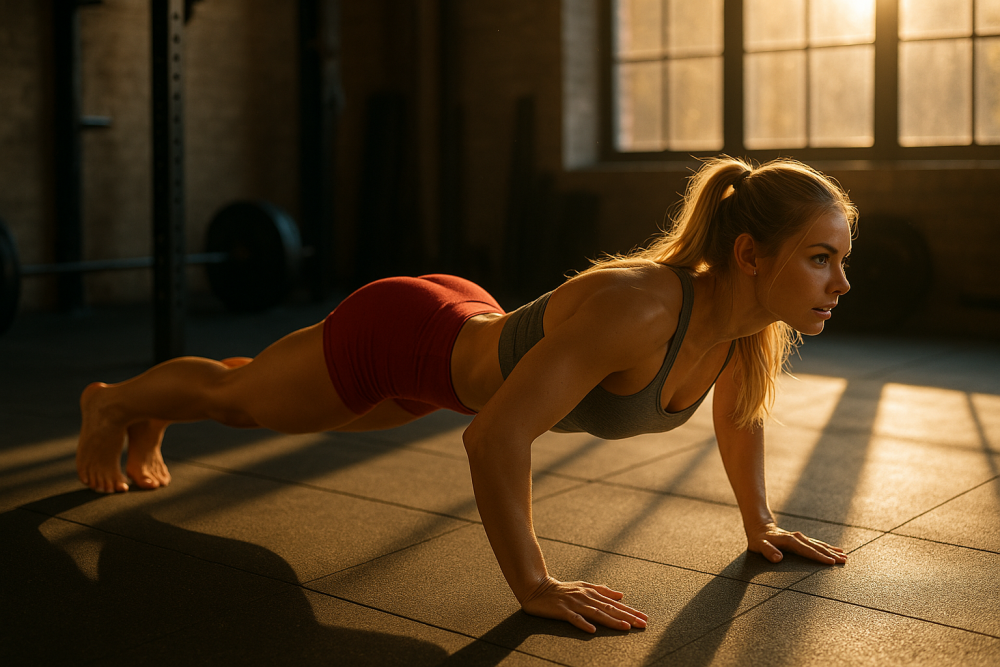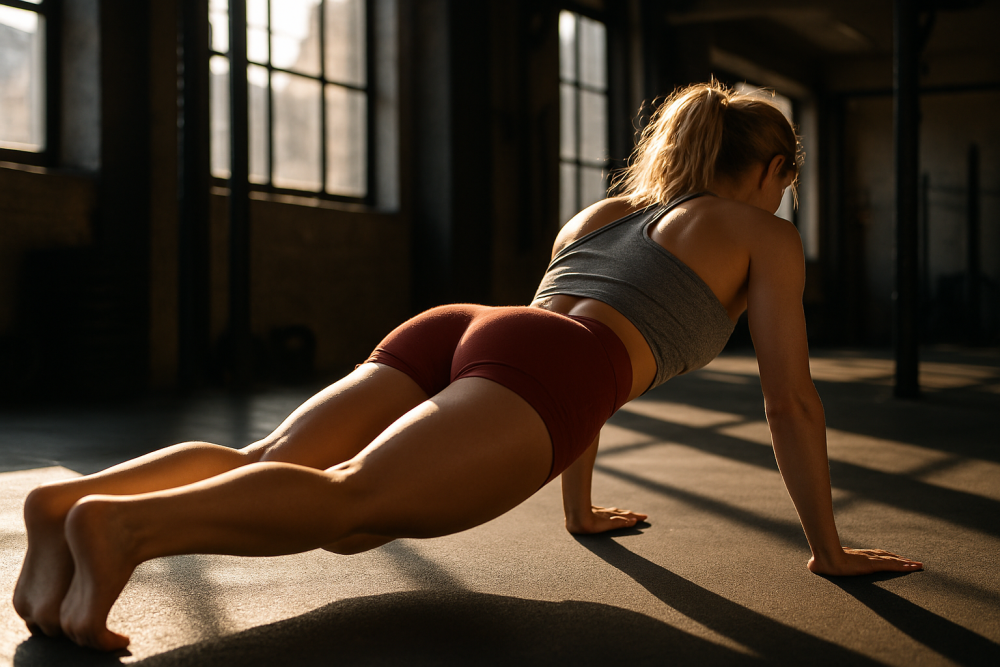Contents
Push Up Exercise: A Complete Guide to Strength, Form, and Variations
Push-ups are one of the most effective and timeless bodyweight exercises you can do anywhere. Whether you’re a beginner or an advanced athlete, push-ups help build upper body strength, core stability, and endurance without any equipment.
Let’s dive into the benefits, step-by-step technique, variations, and tips to master this powerful movement.

Push Up Exercise Benefits
1. Builds Powerful Upper Body Strength
Push-ups are one of the most effective bodyweight exercises for building upper body strength. They primarily target the pectorals (chest muscles), deltoids (shoulders), and triceps, but they also activate supporting muscles like the biceps, upper back, and even the serratus anterior. Regular practice can lead to stronger arms, broader shoulders, and a more defined upper body.
2. Strengthens and Stabilizes Your Core
Every push-up engages your core muscles, including the rectus abdominis, obliques, and lower back. Holding a plank position throughout the movement challenges your stability and improves core control. Over time, this enhances your overall functional strength and can reduce the risk of injury in other activities.
3. Improves Posture and Balance
Good push-up form requires body alignment from head to heels. This encourages the development of the postural muscles that support your spine. Strengthening these muscles helps counteract the effects of prolonged sitting or poor posture, resulting in a taller, more balanced stance and less strain on the lower back.
4. Requires No Equipment – Anywhere, Anytime
One of the biggest advantages of push-ups is their simplicity and convenience. You don’t need dumbbells, machines, or a gym membership. Push-ups can be done at home, in a park, during travel, or even in your office. All you need is a flat surface and a few feet of space.
5. Boosts Cardiovascular Health
When performed in moderate to high repetitions or as part of a circuit, push-ups become a compound movement that raises your heart rate and gets your blood pumping. Over time, this contributes to improved cardiovascular endurance, heart health, and calorie burn—making them great for both strength and conditioning.
6. Enhances Functional Fitness
Push-ups mimic real-world pushing motions and require coordination across multiple muscle groups. This makes them a fantastic functional exercise, improving your ability to perform everyday movements like pushing doors, carrying groceries, or playing sports.
7. Easily Scalable and Adaptable
Whether you’re a beginner or advanced, push-ups can be adjusted to match your level. Start with wall push-ups or knee push-ups, and progress to incline, standard, or decline push-ups. Advanced athletes can add resistance or try variations like clapping push-ups, spiderman push-ups, or one-arm push-ups for an extra challenge.

How to Do a Push Up Exercise (Step-by-Step)
- Starting Position
- Get into a high plank position.
- Hands should be slightly wider than shoulder-width apart.
- Keep your legs extended, feet hip-width apart, and your body in a straight line from head to heels.
- Lower Your Body
- Inhale as you bend your elbows and lower your body toward the ground.
- Keep elbows at a 45-degree angle to your torso.
- Maintain a straight back and engage your core.
- Push Back Up
- Exhale as you press into your palms and push your body back to the starting position.
- Fully extend your arms without locking your elbows.
- That’s one rep!

Push Up Exercise Variations to Level Up or Scale Down
- Knee Push-Ups
A beginner-friendly variation. Lower your knees to the floor while keeping your body straight from knees to head. - Incline Push-Ups
Place your hands on a bench or elevated surface. Great for reducing resistance while building proper form. - Decline Push-Ups
Feet elevated on a platform. This targets the upper chest and shoulders more intensely. - Diamond Push-Ups
Hands close together under your chest, forming a diamond shape. This increases triceps and inner chest activation. - Wide Push-Ups
Hands placed wider than shoulder-width. Emphasizes the chest more. - Plyometric Push-Ups
Add a clap or explosive movement. Builds power and fast-twitch muscle activation. - Archer Push-Ups
One arm bends while the other extends. Prepares you for one-arm push-ups.

Recommendations and Tips for Better Push Ups
- Warm Up First: Get your muscles ready with arm circles, shoulder rolls, and light planks.
- Focus on Form: Keep your body aligned. Don’t sag or raise your hips.
- Control the Movement: Lower slowly and push up with control for better muscle engagement.
- Breathe Properly: Inhale as you go down, exhale as you push up.
- Progress Gradually: Start with modified push-ups and increase difficulty as you build strength.
- Use a Mat: A fitness mat adds comfort for your wrists and knees.
- Stretch Post-Workout: Stretch your chest, shoulders, and arms to prevent soreness and improve recovery.
Final Thoughts
Push-ups are more than just an upper body workout—they’re a full-body strength builder that also enhances core stability and endurance. With no equipment required and a wide range of variations, they’re one of the best exercises to include in any fitness routine.
Whether you’re doing knee push-ups as a beginner or mastering explosive push-ups, what matters most is consistency and good form.
Start small, stay consistent, and push yourself—one rep at a time.
- Go Back to The Exercise Enciclopedia
Follow our Social Media!









